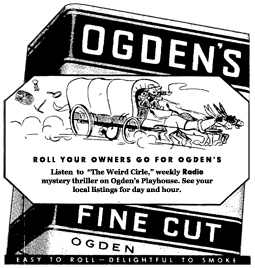The Weird Circle premise is noteworthy: an anthology of classic, supernatural mystery thrillers from the pens of the world's best known and respected supernatural fiction authors. The scripts--with rare few exceptions--acquit themselves well for the genre.
The supernatural thriller genre was highly popular throughout the mid-1930s, right on through the mid-1950s over Radio.
 The Weird Circle was an RCA-syndicated feature from RCA Recorded Program Services, the independent programming production division of RCA Victor. Its sound quality, voice talent, and production values meet traditionally high RCA standards. As a consequence of those standards, the resulting recordings have stood the test of time--a huge bonus for Golden Age Radio transcriptionists, preservationists and collectors.
The Weird Circle was an RCA-syndicated feature from RCA Recorded Program Services, the independent programming production division of RCA Victor. Its sound quality, voice talent, and production values meet traditionally high RCA standards. As a consequence of those standards, the resulting recordings have stood the test of time--a huge bonus for Golden Age Radio transcriptionists, preservationists and collectors.The program was reportedly recorded out of RCA's New York Studios, and almost immediately licensed to both NBC-Red/RCA [WEAF] and the Mutual Broadcasting System [WOR and W-G-N], consisting of two, 39-script seasons of 25-minute productions, for local sponsors and networks alike. As illustrated in the Provenances section, NBC [RCA] created their own set of transcription disks as well, as did the Armed Forces Radio and Television Service (AFRTS).

Sponsors varied as the series was picked up throughout affiliate stations across the U.S. One incarnation of note was Ogden Fine Cut Tobacco's sponsorship of The Weird Circle, packaged as the Odgen's Playhouse. Ogden's Playhouse didn't air the run in transcription order over U.S. stations. It aired other features under the Ogden's Playhouse banner as well. In Canada however, Ogden's Playhouse aired The Weird Circle series weekly without other intervening productions. Other sponsors of note were the Farr Ice Cream Company [West Coast], 7-Up [Arizona], and Remar's Bread [West Coast].
The Weird Circle's earliest airing appears to have been over Chicago's W-G-N, a founding Mutual Broadcasting System station, as a sustaining program for its first season (the program aired as two syndicated seasons of productions). Previous difficulty in nailing down the program's episode sequence and earliest broadcast run are probably contributing factors in the poor results of past efforts to document this otherwise highly collectable program.


No comments:
Post a Comment